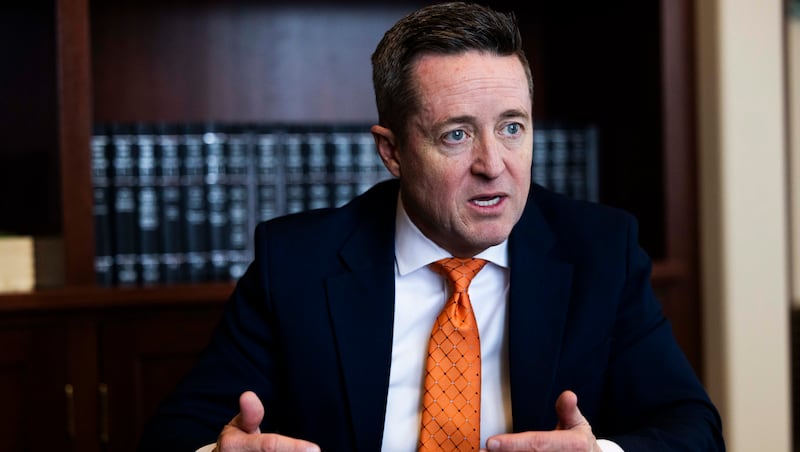In the first few months of President Donald Trump’s second term, his record-breaking actions have left state legal experts shuffling to either support or combat the executive orders.
“On a daily basis, we have more of them coming out,” Utah Attorney General Derek Brown said Tuesday during a panel hosted by the Orrin G. Hatch Foundation. “This is something we’re doing a lot of work on, because every one of these executive orders impacts some government agency.” Every time the White House takes federal actions, Brown said he has a team of attorneys tackling what seems like a constantly “moving target.”
Trump has signed 143 executive orders in 2025 so far, according to the Federal Register. Consequently, he’s accumulated more than 200 lawsuits across the nation’s judicial system in some form of retaliation.
Brown, along with Texas Solicitor General Aaron Nielson and Chris Bates, former Utah deputy solicitor general and current shareholder at the firm Kirton McConkie, discussed the ongoing relationship with attorneys general across the country and how the new administration has shifted the nation’s legal landscape.
Matt Sandgren, the executive director of the Orrin G. Hatch Foundation and panelist host, sought the legal experts’ insights on several hot-button political issues in America, including illegal immigration, religious liberty, and the collaborative and conflicting dynamics among state attorneys general.
On illegal immigration
During his statewide campaign last year for the office of attorney general, Brown said the issue of illegal immigration was brought up to him more than any other among Utahns.
He noted that, among other Republicans’ platforms across the country during that same period, it seemed to be the party’s No. 1 issue.
“We went from where there was an average of upwards of 8,000 illegal crossings in the southern border per day,” he said, comparing it to the month of February when the U.S. Customs and Border Protection arrested nearly that many people — 8,347 — in a whole month.
The continued problem, Brown said, is that even though illegal crossings have decreased, the influx of fentanyl and other drugs remains of high concern in Utah.
“I think a lot of people kind of separate the two issues as if they were distinct, but they’re really not. It’s the same cartels that are moving people and moving drugs,” Nielson noted.
The way drugs are still being trafficked in is “you’ll have people in one place to divert attention from law enforcement, and then they move drugs where people aren’t. It’s an integrated problem,” he added. The core of the issue is cartels: “these are transnational paramilitary operations.”
Bates said the related issues of asylum and visa overstays don’t get enough media attention.
Once a person passes the credible fear interview, which grants a higher probability of asylum, they then have to wait for their asylum case to be fully adjudicated, which can take years, he said. There are currently millions of backlogged cases. Americans also don’t realize how many immigrants are under the umbrella of living here illegally because they remained in the country after their visa expired, Bates said. In 2022, over 850,000 foreign visitors stayed past their visa expiration date, which was a record-breaking amount, per the Center for Immigration Studies.
Bates said a possible solution the Trump administration will undertake is making visa and asylum interviews more stringent.
On religious liberty
Sandgren pointed out that there are currently a number of legal cases regarding religious liberty that occurred during the Biden administration, and wondered how drastically, if at all, the change in administration has affected America’s religious body.
During last month’s oral arguments in Oklahoma Statewide Charter School Board v. Drummond, U.S. Supreme Court Justice Brett Kavanaugh said the cases regarding religion “are some of the most important cases we’ve had of saying you can’t treat religious people and religious institutions and religious speech as second-class in the United States.”
Brown said that as an elected official, fighting for religious liberties allows him to enact policy decisions that matter, and for him, religious liberties are a core issue, so his office has joined amicus briefs with many other states, including the case in Wisconsin: Catholic Charities Bureau, Inc. v. Wisconsin Labor & Industry Review Commission.
“Frankly, one of the things that matters to me more than just about any issue is just that free expression right that we have under the First Amendment. It is under attack in many places in the world,” he added. “If you don’t have the ability to express yourself in a free way, you don’t have the corresponding outgrowth, which is things like religious expression.”
Bates added that under the new administration, “We’re seeing much more robust religious liberty protections in the rules coming out of the Trump administration, and an understanding, I think, by the new administration, that religion is more than just what you do for an hour or two or three hours at church on Sunday.”
“Religious practice extends more broadly,” he emphasized, “so that when we think about religious liberty protections, it’s not just are you at church? Are you at a church service?” Instead, “It applies more broadly, and that these sorts of religious liberty exemptions should extend more broadly than what the Biden administration often provided for.”
Correction: An earlier version of this story misidentified Matt Sandgren’s last name.
Read the full article here


